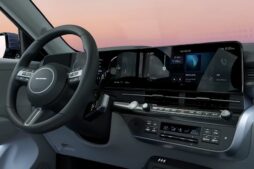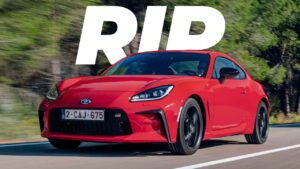Common Sense Prevails at Last.
The widespread use of large, in-vehicle screens has come at the cost of traditional buttons. Nonetheless, the revival of physical controls could be crucial for automakers to attain top safety rankings from Euro NCAP for their vehicles. Surely, this is a desirable trait for car manufacturers looking to attract customers. In fact, starting January 2026, regulations will penalize cars without essential traditional controls by reducing their points.
The European New Car Assessment Programme plans to reduce the safety scores of recently evaluated vehicles that lack buttons, levers, or gauges for crucial features such as turn signals, hazard lights, horn, windshield wipers, and emergency call. The latter is referred to as the eCall function and has been obligatory in the European Union for a number of years. This feature automatically dials the nearest emergency number in the case of a severe car collision.
While the existing list is a positive beginning, it could be further improved by incorporating distinct controls for climate adjustments. It should not be assumed that all car manufacturers are simply installing iPads onto their dashboards and considering their work complete. In contrast, Hyundai is opting for more conventional controls in their vehicles, while other brands like Toyota have remained faithful to the simple setup of featuring shortcuts on the dashboard.
Ineos may be going a bit overboard with their use of buttons and knobs in the design of their Grenadier SUV, as evident in the images showcasing its cockpit-inspired interior. However, Skoda appears to have struck a balance that will appease both financial advisors and car buyers alike. The newly released Superb features three manual dials with integrated customizable screens, allowing for adjustments to be made using the same controls.
Matthew Avery, the head of strategic development at Euro NCAP, has recently announced a new initiative to hold automakers accountable for their use of screens in vehicles. This decision was made in order to discourage the over-reliance on screens by drivers while operating their vehicles.The rationale behind this move is to ensure that drivers are not solely relying on screens for important information and functions while driving. This includes features such as navigation, climate control, and entertainment systems which, if used excessively, can compromise the driver’s attention on the road.Avery stresses that while technology has greatly improved in modern vehicles, it should also be designed with safety in mind. It is not enough to simply have a high-tech interface, but it must also be intuitive and easy to use without causing distraction.Euro NCAP’s decision to implement penalties for excessive screen use is seen as a proactive approach towards addressing potential safety concerns. By holding automakers accountable for their designs, it is hoped that they will prioritize safety and user-friendly interfaces in their future models.Furthermore, this step also highlights the importance of responsible driving. Drivers must resist the temptation to constantly interact with screens and instead, focus on the task of driving to ensure their safety and that of others on the road.In conclusion, Euro NCAP
The issue at hand is one of safety, as drivers are compelled to divert their attention from the road in order to navigate the complex menus of a modern infotainment system. In contrast, physical buttons and knobs remain consistently located on the dashboard, enabling intuitive use. The trend towards screens, however, can be attributed to cost-saving measures by car companies, albeit they would never openly admit to this strategy of replacing buttons with screens for lower production costs.
Although the announcement may appear positive, it is essential to recognize that Euro NCAP does not possess the authority to compel car manufacturers in Europe to reintroduce traditional controls. As an independent team responsible for conducting crash tests, they are unable to enforce a requirement for companies to switch back to physical buttons and knobs. This decision would need to be made by the European Union.
Despite this, we believe that all car manufacturers are determined to obtain the highest five-star ratings and will work hard to adhere to the new regulations. It is hoped that in the future, there will be more than just those five criteria set for 2026. It will be intriguing to observe if modifications made to vehicles sold in European Union nations will also impact the corresponding models in North America and other markets. Creating separate interiors for the same car is not advantageous from a business perspective, so it is possible that customers outside of the EU may also profit from these changes, as long as automakers choose to comply.
During an interview with Automotive News Europe at CES 2023, BMW’s CEO Oliver Zipse expressed his strong belief that large screens in cars will be prohibited within the next decade. He stated, “In 10 years, that is gone. Probably the regulator will not allow it.” Zipse also emphasized, “If you have to look down to operate your car, we think it’s a big mistake.” While it is uncertain if this prediction will come to fruition, the recent legislation from Euro NCAP is a positive move towards safer driving practices.
Source: The Times (subscription required)






